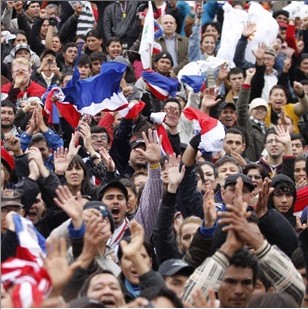(IP) Thousands of Paraguayan workers took to the streets in the capital to protest the approval by legislators, of the bill known as the bill to promote public-private partnerships, originally put forth by President Horacio Cartes. The bill aims to privatize some public services and infrastructure, and angers many in the South American nation.
The demonstrations took place in Asuncion, where protesters blocked roads and highways and carried signs that read “Paraguay is not for sale.”
Critics of the plans include public sector labor unions, farmers and indigenous peoples, who say the bill would lead to mass privatization, layoffs and an invasion of foreign companies.
"We are against the public-private alliance, which is the selling of our dear Paraguay, the little that we are left…after everything that the rich took," said protester Reina Hermosilla.
Former president and senator Fernando Lugo is also a fierce opponent of the bill and condemns it as an attempt to push through privatization. Under privatization, infrastructure services such as electric, transport and sanitation services as well as roads and tolls would change from state control to private ownership.
The state would use public revenue to finance private business ventures with the proceeds paid to the private investors.“With the law everyone will pay the price and just a select few will get richer,” wrote Lugo on Twitter.
The country’s two legislative chambers have already approved the bill; however, debates are now being held on whether to grant President Cartes the power to make a final decision. The Paraguayan government is facing a financial crisis as the country is suffering from the biggest deficit in its history and is also one of the poorest countries in South America with 39% of the population living in poverty.
Cartes was sworn in as president on August 15, and had vowed to wage war on poverty, and generate job opportunities.He is described as a multi billion dollar tobacco magnate, who made his fortune in a myriad of business interests including banking and cigarette imports to the U.S., before taking office. Before his election, he had come under suspicion for drug trafficking and money laundering from the U.S. Drug Enforcement Agency, according to a 2010 U.S. diplomatic cable released by Wikileaks.


crowds protest attempts to turn municipal and social services into for profit ventures






